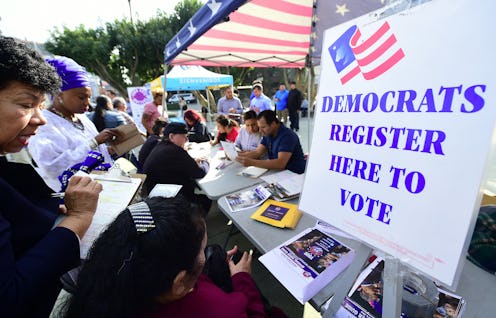News
You Can Vote Without Declaring A Party
There's no way to miss the message: Uncle Sam wants you to vote this November. Pick a president, any president. Well, not any president, actually. Unless you're planning on writing in your own candidate, like your dog, you'll have to select one of the candidates on the ballot. Though you are welcome to vote for whomever you please, the two-party system still stands, and the question on your voter registration form asks you to register: Democratic, Republican, or Independent. But, can you vote without declaring a party?
The simple answer, according to USA.gov, the federal government's official — if simplistic — website, is that yes, you can vote without a party affiliation. According to the government's online presence, anyone who is registered can vote "regardless of whether you're registered with a political party or not." This is the black-and-white answer: you can vote for whatever presidential candidate floats your boat, even if you are not registered as affiliated with any party. This is called, intuitively enough, "no party affiliation" voting, and plenty of people do it.
Of course, on Voting Day, more than just one presidency is up for grabs: many of your local and state officials will also be elected or reelected, as will be all 435 members of the U.S. House of Representatives. If you're not affiliated with a party, you can still vote in these elections too, for whichever nominee you choose.
It's worth differentiating between primary elections and the general election, because for unaffiliated voters, there's a big difference. Nine states have closed primaries, which means that if you're independent or not registered with a party, you can't vote in party nomination contests. Seven states have partially closed primaries, which allow each political party to decide whether voters who are unaffiliated or not registered with their primary can participate in their primaries. In 28 states, unaffiliated voters can vote in any primaries, and in 15 of those states, primary voters are allowed to cross party lines and vote for someone of the "opposite" party than the one they are registered with.
No-party is the new political party. An especially large number of people are registered as no-affiliation voters in Florida, a major swing state and a crucial win for the presumptive winner of the presidential rate. About 27 percent of Florida voters are unaffiliated with a major party, meaning they did not vote in the 2016 primaries, but they will be able to take their pick on Nov. 8.
This election has created a pretty big cohort of people who feel they can't, or don't, support either major party candidate, including a chunk of Bernie Sanders' supporters, who feel cheated out of the Democratic nomination. But if you're one of the thousands of unaffiliated voters across the country, or if you're an independent like LL Cool J, make no mistake about it — your vote matters.
